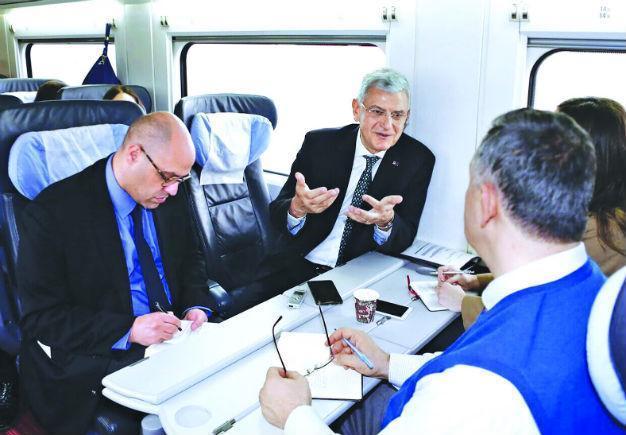EU must keep its promises to Turkey: Ankara
Serkan Demirtaş - ESKİŞEHİR

HÜRRİYET photo
The responsibility for re-energizing Turkey’s accession process will belong to the European Union even in the event that the ongoing Cyprus talks fail to produce a breakthrough, Turkey’s EU minister has said, asking the bloc to keep its promises toward Ankara.
“In the event that the Cyprus problem cannot be resolved, the removal of the blockages imposed on chapters by the Greek Cyprus without an EU Council decision or in the absence of a legal basis belongs to the EU,” EU Minister Volkan Bozkır told a group of reporters traveling to Eskişehir with him on Jan 7.
“A letter signed by Donald Tusk [president of the EU Council] and Jean-Claude Juncker [president of the EU Commission] and sent to our prime minister stands as a commitment to the opening of these five chapters. They don’t say that these chapters can [only] be opened if the Cyprus problem is resolved,” he said.
The letter Bozkır referred to was sent to the Turkish government as an annex to a Nov. 29, 2015, joint statement between Turkey and the EU and cited five chapters the EU Commission promised to prepare for opening in the first quarter of 2016.
The five chapters are under a Greek Cypriot veto, and there are concerns that the failure of Cypriot reunification talks would also have a negative impact on the Ankara-Brussels relationship.
“Our position in keeping the Cyprus issue unrelated to our EU accession process remains. We will not allow any kind of involvement of the Cyprus problem in our accession process. There is this commitment of the EU. But in the event the Cyprus problem is resolved, then all these chapters will absolutely be opened automatically,” he said.
Turkish and Greek Cypriots have been negotiating for a sustainable solution to the decades-old problem with high hopes for a referendum to be staged in the coming months. The two parties’ voting in favor of creating a new partnership state will have a drastic impact on the Turkish accession process as well.
Political dialogue to be intensified
The joint statement reached by Turkey and the EU also opens new avenues for the intensification of political and economic dialogue, the minister said, announcing that Turkish and EU leaders would first come together on Jan. 25 in Turkey. EU Foreign Minister Federica Mogherini, EU Commissioner Responsible for Enlargement Johannes Hahn, Turkish Foreign Minister Mevlüt Çavuşoğlu and Bozkır will come together in a four-way meeting. “We’ll meet more frequently afterwards,” Bozkır said, adding that Turkey’s foreign minister would also increase the number of visits to EU-related meetings.
Another top meeting will be held in the field of energy as the Turkey-EU high-level Energy Cooperation Council will meet in Istanbul on Jan. 28-29. “This meeting will not only focus on the TANAP [Trans-Anatolian Pipeline Project] and the Turkish Stream but also on potential projects for the transportation of reserves from Turkmenistan, Qatar, Iran, northern Iraq and off Cyprus,” he said.
In the meantime, Turkey and eight EU countries with similar policies on migration issues will come together at a mini summit on Feb. 18 in Brussels.
Half a million Turks to participate in Erasmus
In parallel to the political dialogue with the EU, the Turkish minister also underlined the government’s work to deepen the bonds of Turkey’s people toward the EU with seminars and workshops held in different cities with the participation of civil society organizations.
One of the best ways to this end is to ensure more Turkish people benefit from EU funds and projects like Erasmus, he said, noting that around 300,000 Turkish people from all walks of life had been given Erasmus funds and thus could study in EU countries.
“Among them are students, apprentices and others which shows a wide social base has been benefiting from [the project]. With a resource of 700 million euros, we are planning to have another 500,000 Turkish people benefit from Erasmus by 2020,” he added.
NGOs to hold conferences in EU countries
Turkey’s communication strategy does not only address the needs of providing information to the Turkish people in Turkey but also to the European public opinion on Turkey and its accession process.
“We have so many big, nongovernmental organizations like TÜSİAD [Turkish Industry and Business Association], TOBB [The Union of Chambers and Commodity Exchanges of Turkey], MÜSİAD [Independent Industrialists’ and Businessmen’s Association] and the İKV [Economic Development Foundation]. We are planning to hold conferences inside Turkey as well as in EU capitals other than Brussels,” he said.
A new concept will be implemented during meetings in EU countries, Bozkır said, underlining that more foreigners than Turks would be invited to the conferences, which would bring high-level decision makers, businessmen and academics together.
